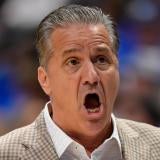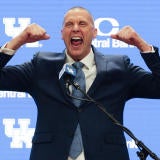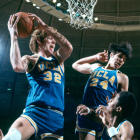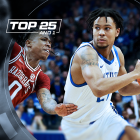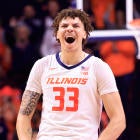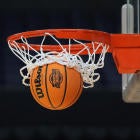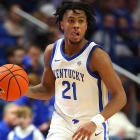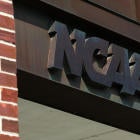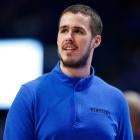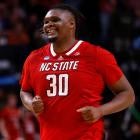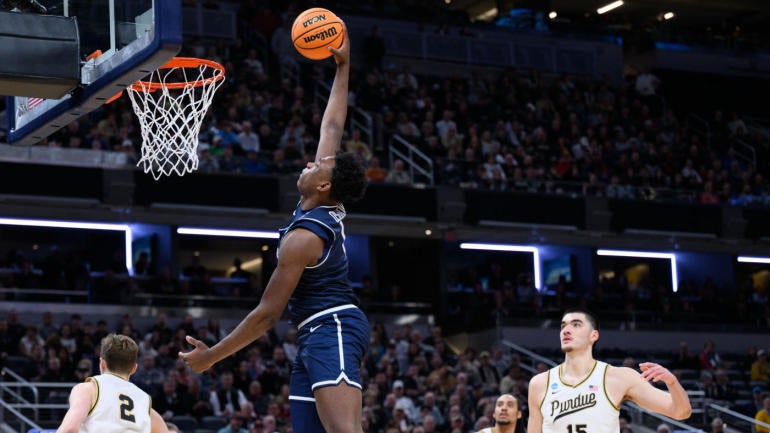
CHICAGO -- The biggest job interview of your life is stressful, and Dalton Knecht needed just a little splash of home to break the tension. Some prescient Big Sky news offered the levity Knecht didn't know he needed. Somehow, some way, one of the smallest conferences in the country has finagled its way into the NBA Draft Combine.
Knecht is a former Big Sky star who is hurtling toward being a first-round pick. His rise from paying his way at Northeast Junior College to SEC Player of the Year was already quite a story. But Great Osobor, a former Big Sky bench mob member, has created quite a ruckus throughout college basketball after inking a $2 million, NIL-laced payday this week to transfer to Washington.
The NBA Draft has felt the ripple. Numerous stay-or-go decisions could be impacted by the largest NIL deal on record.
"That's what he got?" Knecht asked with a wide grin. "My guy! Big Sky, represent. That's so good for him. I'm excited for him and Coach (Danny) Sprinkle in Washington. He's a great coach. Wow, that's big-time."
There's a bit of shock and awe from some of the best college basketball players in the country.
"Can I go to Washington?" former Marquette star Tyler Kolek said jokingly. "Those top guys are getting one or two million plus? I'm happy for him, I wish I had been a part of that."
"That's a crazy number," Washington State wing Jaylen Wells added. "Not going to say a specific number, but my NIL wasn't close to that. But coming from Division II, not having a full scholarship, paying for college and two years later, you see guys with two million playing in college? It's crazy to think about."
Earned? Yes. Crazy? Maybe. Good? Depends on who you ask.
Jalen Bridges has lived both sides of it. Bridges was the top-ranked player in West Virginia all the way back in 2019, but he was ranked just outside the top 80 nationally. Life was different back then. Bridges redshirted his freshman season, and NIL hadn't been introduced to the tinderbox yet.
"I had nothing," Bridges says. "I don't know how I was surviving, for real. I was getting a monthly stipend. It was like $1,500 and my rent was like $1,000. I was living off like $500 a month. I was working out every day. I gotta eat. I have to do a lot of things. I didn't have to pay for my books, but stretching $500 a month is hard. I don't know how I did it."
Even after the Pandora's box of NIL was opened in 2021, it wasn't like this. When Kolek transferred from George Mason to Marquette ahead of the 2022-23 season, he noted he wasn't getting a huge NIL payday. Baylor Scheierman was in a similar boat when he left South Dakota State and became one of the most sought-after players in the 2022 transfer portal cycle.
"A lot of people thought I was getting a crazy number like that when in reality, I really wasn't. … Ultimately, I chose to go to Creighton where I made good money but maybe not what I could have made somewhere else, because of the trust factor and knowing how it was going to be."
Even dating back to last year, the market for the top big men has rapidly evolved. Syracuse transfer Jesse Edwards and Oregon transfer Kel'el Ware were two of the top big men in the 2023 cycle. Both were dumbfounded by the type of money one of the top big men in the 2024 cycle was able to reel in.
"Two million is crazy," Ware says. "I don't even know how they got that together. I mean, shoot. Congrats to him though. That means a lot. You at least gotta be like Player of the Year or something!"
The 6-foot-8 Osobor averaged 17.7 points and nine rebounds per game in one year at Utah State after transferring in from Montana State.
There are winners and losers in everything, and the fallout from the Osobor deal is obvious. The NBA Draft Combine is littered with some of the best available transfers in the portal. They might not admit it, but the precedent has been set for some of the top collegiate free agents.
Florida State transfer Jamir Watkins ranks 10th in 247Sports' top transfer rankings and is arguably the best big guard left on the board. Illinois' Coleman Hawkins ranks 24th overall, but he's certainly the best stretch-four left on the board. Both have major decisions to make after digesting all of the NBA's feedback. If the Mountain West Player of the Year can get $2 million, what's on the table for an All-Big Ten big man like Hawkins or an All-ACC guard like Watkins?
They have a chance to be major winners.
"I know someone just became the highest-paid player, and I wouldn't want to have that label," Hawkins said. "I'd be making a good amount, but that's a lot of added pressure when you label yourself that.
"I've had lots of offers. I've had offers to sign with agencies. I'm not a person who is moved by money, and if I'm being honest with you, to have that label is just an unwanted amount of pressure because as soon as you do something wrong, as soon as anything happens, as soon as you have a bad game, people are just going to question all that money. So even if I did come back to school, I'd let you guys guess whatever amount I got. I would never share that information because, I mean if I'm being honest, it's kind of selfish. Not only for yourself but for your teammates knowing what you made. I wouldn't have those conversations with my teammates. I wouldn't want anyone to know what I made."
MORE: Predicting top NBA stay-or-go decisions, including Coleman Hawkins
Bridges believes guys who were in his shoes (top-80 recruits) could continue to be left out in the cold in the rapidly evolving market … even after COVID seniors exit the fray.
"Honestly, my advice to the young guy; unless you're a surefire, one-and-done, I'd probably go low-major or mid-major for a year because you're not, realistically, going to play," Bridges said. "They are paying these kids millions of dollars to come play basketball. Come hell or high water, those guys are going to be on the court. They're not going to pay them that money to sit them on the bench. As a freshman, you gotta realize that. You might have to go somewhere that might not have as much NIL money so you have a chance to have the opportunity to beat someone out for minutes. Go mid-major, average 15 points, 5 rebounds and go get your two million next year and hopefully you have a great career and you don't have to stress financially."
Even five-star, one-and-done freshmen like Baylor's Ja'Kobe Walter and Duke's Jared McCain are fully on board with why there's a financial gap between the earning potential of the transfers and the top freshmen in the incoming class.
"The people transferring in college, they've already proven themselves at the college level," McCain says. "I can see why they get more money, but for some freshmen -- shoutout my guy Cooper Flagg -- I think he'll be the best player in college."
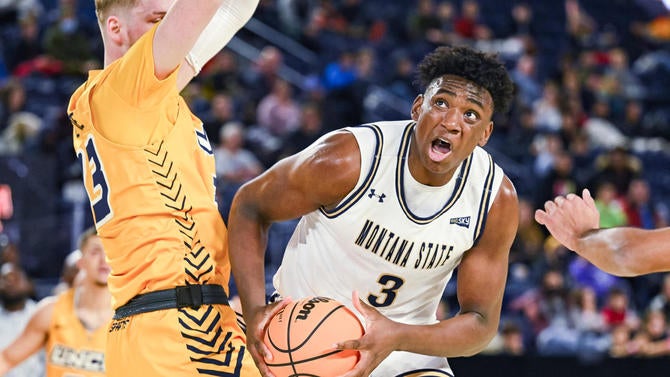
"Will it work?" continues to be an underlying theme throughout the mountain of discourse. Osobor is a fantastic player. The floor for Osobor at Washington remains so high because there's a proof of concept. Osobor was successful at Montana State under Sprinkle. He was successful at Utah State under Sprinkle. Why wouldn't he be successful at Washington under Sprinkle?
But every situation is oh, so different. Unlike Osobor, not every transfer gets to follow his old coach. And sometimes, the best financial offer is not the best basketball offer.
Jaylon Tyson noted he might only be an NBA prospect because he didn't take the highest-dollar offer on the table last year. It wasn't a $2 million deal, but Auburn and Kansas had impressive financial packages for the then-Texas Tech transfer.
Tyson chose Mark Madsen and Cal.
At Kansas, Tyson easily could've fallen behind Kevin McCullar and Hunter Dickinson in the pecking order. At Auburn, it would've been the Johni Broome show with Tyson sliding into that No. 2 role … at best. At Cal, Tyson was the piece, not a piece. Madsen armed him with a 30% usage rate and loads of on-ball reps. He's erupted into a legitimate candidate to hear his name in the first round in next June's draft.
"Cal was probably the least amount of money, but the opportunity, to play for Mark Madsen and that coaching staff, I thought I made the best decision," Tyson said. "Obviously, I did because I'm here today. When I was going through the portal process, I'm glad I had a good circle to tell me that it's not about the money. The money is not the long-term thing. I'm just glad I made the right decision."
The examples of taking less money in the short term and it paying off in the long term were littered all over the NBA Combine. Tyson, Scheierman, Clemson's PJ Hall and UConn's Tristen Newton all noted that bigger-money deals could have been had, but the fit at their respective programs was too good to pass up.
"There's a lot of money in college sports," Hall said. "If you got the opportunity to make some, go right ahead. I had a different philosophy of staying at the same place for four years. I probably could have had the opportunity to make more money at another place. But it's all about the right situation. If that two million is the right situation for him, then take it and have an awesome time. Last year, when I could have gone back and I did, I didn't bid or negotiate. I knew my coaches were going to take care of me. They did. I was compensated handsomely. Now, it's not just staying in the same spot. It's all about situation. There have been guys I've played with at Clemson who left and got drafted because it wasn't a great spot for them. Sometimes, it's just not the right situation and it's not their fault."
Osobor's $2 million deal is also on a legitimate contract that's been verified by third-party members. That's starting to be the case for some players, but it isn't everywhere … yet. Kentucky's Antonio Reeves noted that he didn't have a contract in Lexington. His NIL came from mostly working camps. Schiermann says Creighton doesn't have contracts, either. But Watkins had a contract at Florida State based off what he did at VCU the previous season. West Virginia had Jesse Edwards on a contract. Pelle Larsson says Arizona had his deal written up in advance, too.
"Contracts aren't for when things go good, they're for when things go bad," Larsson says. "I trusted the people at Arizona. I've been good to them, they had been good to me."
Bridges noted he may not have returned to Baylor for one final season without a contract.
"I wasn't going to put myself in a position where someone could play with me," Bridges said. "I am going to look out for myself. I really wanted to stay in the draft last year. I probably wouldn't have gotten drafted but I would've figured it out in the G League. I believe in myself. I have the skillset. I definitely could have done that. Going back was honestly the best decision of my life. Any NIL money amount aside, it was the best decision. I got my degree. I'm a first-generation college graduate. It's awesome. It was super worth it."
It wasn't all that long ago that Nijel Pack's two-year, $800,000 deal (with a car) in Miami shaped the conversation. Now, $400,000 a year for a good starting guard feels like a bargain in free agency.
Times have changed.
"I don't know man," UNC stud Harrison Ingram said. "I hear a lot of stories about people saying they get certain numbers and they don't get it. Time will tell. Congrats to him. Two million? That's crazy. I'd love to get two million."
But you better be good.
"I ain't going to lie to you, he's going to have to put up 20 (points) and 10 (rebounds)," Tyson said. "But these coaches don't put those expectations on you. They want you to do great and win games but when you think about all that stuff, it gets in your head. I think he should just go out there and be confident in who he is."
MORE: Latest college basketball transfer portal scoop on top uncommitted players







